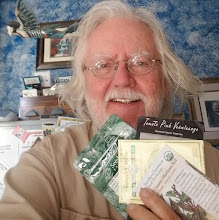 A wooden aqueduct, part of Santa Barbara's original water supply (destroyed in last year's wild fires) is somewhat illustrative of the necessity of fresh water for civilization.
A wooden aqueduct, part of Santa Barbara's original water supply (destroyed in last year's wild fires) is somewhat illustrative of the necessity of fresh water for civilization. Recently, I was joking with a friend about the presence of lawns in Los Angeles. I think I concluded our conversation with a remark to the tune that, “It is utterly ridiculous to have a lawn in Los Angeles.”
A colleague, someone who teaches in the same horticulture program as I do, standing behind me, heard the comment and erupted into a tirade in defense of lawns and ended by declaring, and I think I'm pretty close to exactly what she said, “If we didn't have lawns, Los Angeles would be a hell hole!”
I was stunned. I thought I'd been transported back to the early 1960's. Such beliefs do not hold sway with the folks I know and I was shocked that a co-faculty member could hold this as a common truth.
Perhaps I'm being a little elastic. Could have been early 1990's. In my mind, wrecking other eco-systems to have green lawns went out of style a long time ago. No matter of the exact approximate date, by 2010 I thought even the village idiot knew that piping water from other places in order to have a lawn to look at was considered, at best, gauche.
After all, I would wager that 90% or more of the lawns in Los Angeles are walked on only when mowed. Like a Hummer H2 they are more to be looked at than driven.
But now, we are crossing beyond merely destroying our neighbor's ecosystems to water our pretty, but, worthless lawn. Currently, more and more, we are confiscating ('diverting' in our modern parlance – it means 'stealing') water that used to be used for agriculture. Water from the Colorado River, all up and down its course is being diverted to water lawns in Los Angeles, Tucson and many other cities. This water is not used for food production. That it is used to drink and bathe in cities does not bother me. But to divert this water from the river to indulge in the great luxury of a lawn is decadently selfish and unconscionable.
But to the direct assertion of “Los Angeles would be a hell-hole.” Some folks would argue it is one already and the grass we have has yet to ameliorate it so why the bother? I can only assume her concerns rest on the transpiration of moisture into the air by all this worthless grass. Plants release water into the atmosphere as they photosynthesize and all this grass around us photosynthesizing has to have some beneficial effect on our daily temperature highs. I'm sure she is right.
If you have only to choose between lawn and cement, I think lawn wins on being cooler, but concrete... Concrete has it's own sustainability problems and it's not a choice we have to make, so it's a moot question.
If you have only to choose between lawn and cement, I think lawn wins on being cooler, but concrete... Concrete has it's own sustainability problems and it's not a choice we have to make, so it's a moot question.
However, all plants release water as they photosynthesize, so grass is only one of thousands of plants we could choose to render us cooler. Only a precursory look, though, renders a conclusion that, of all the choices, grass ranks with other thirsty plants as the least desirable to help achieve this cooling. We have thousands of choices to cool us, and a good portion of those are drought-tolerant species. California oaks, needing no supplemental water in average years release some 280 gallons of water a day to help cool our atmosphere. Let's see: no water, no mowing, shade in the summer, beautiful leaves and 280 gallons in one day. Now, tell me again, why we need lawns in Los Angeles?
If low growing plants are essential to your well-being, then one of many of California's native grasses, sedges and other grass-like plants make lovely undulating lawns that neither drink excessively nor need mowing. They do better with some water, but nothing like the amount of water required by our lawn grasses. And there is a veritable cornucopia of California native plants that will photosynthesize and produce moisture in the air cooling our little 'hell-hole' quite nicely, all using less water than the ubiquitous lawn.
In fact, thousands of pounds (millions?) of good clean, healthy food could be grown in those same spaces and done so beautifully (as described in my upcoming book) using much less water than grass and which you will mow. There is no way to justify the ugly and horrible effects our lawns have on other ecosystems and there is no argument that sways me toward eating grass, even over eggplant!
In my mind, there is no line of reasoning that can be conjured to keep any private lawn. To argue that they are essential for the cooling of our atmosphere is simply a ludicrous proposition I cannot accept. Lawns are a drain on limited resources, provide no benefit that cannot be better provided with less input from other plants and impart only a limited aesthetic appeal. I say yank out the lot of lawns.
If you must have lawn, may I suggest you find a climate that supports your choice. You, and your lawn, are not welcome here.
david
david










.jpg)